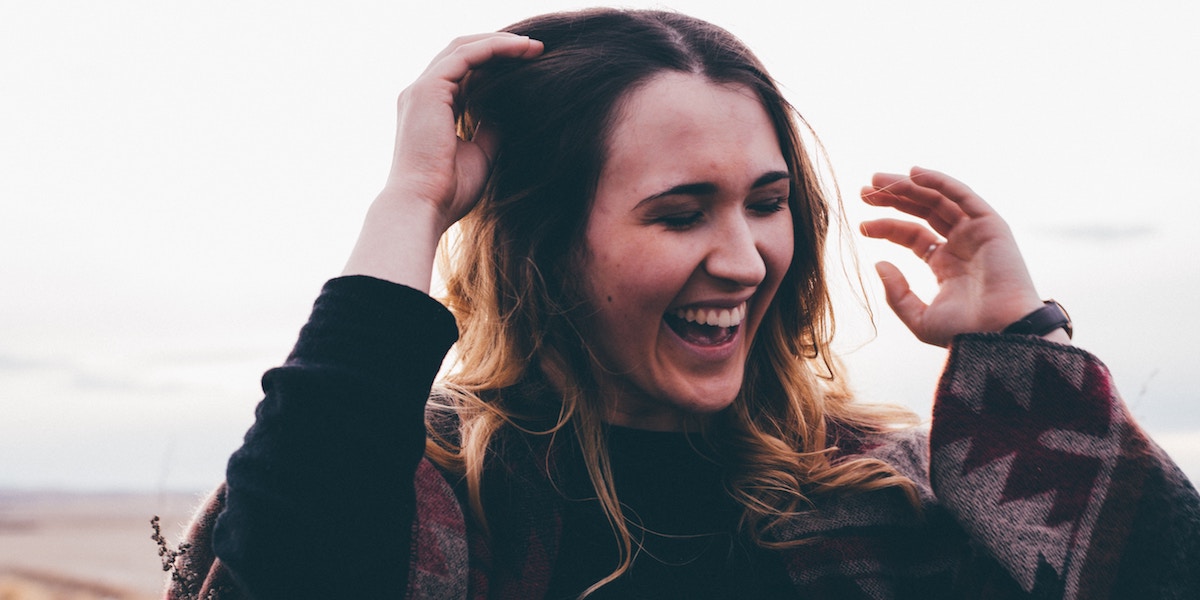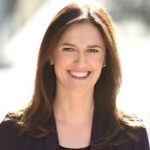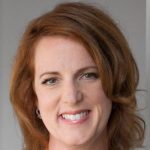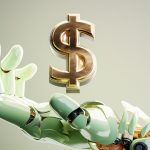Caroline Webb, author of How to Have a Good Day, specializes in the application of behavioral science to the workplace and beyond. She is CEO of Sevenshift and a Senior Advisor to McKinsey and Company, where she was previously a partner. Caroline recently sat down with world-renowned business thinker Whitney Johnson, author of Build an A-Team and host of the Disrupt Yourself podcast, to discuss little steps we can all take to have better days.
This conversation has been edited and condensed. To listen to Caroline and Whitney’s full conversation on the Disrupt Yourself podcast, click here.
Whitney: So, you’ve told me you were a bit of a daredevil as a child, and you liked to write stories. What did you think you were going to do when you went to college?
Caroline: I wanted to be an astrophysicist. I was very deep into sci-fi and read everything that I could about black holes and the early beginnings of string theory and multiverse theory.
Whitney: Were there any particular books that you especially loved?
Caroline: Oh, I loved Carl Sagan. The truth is that the kind of science fiction that I most liked was less about natural science or technology—I was much more interested in how a society evolves. If you push an assumption to a limit and take it forward into the future, how does society [progress]? Of course, that was perhaps a clue that I was slightly more interested in people-science than I was in natural science.
So when I took a class in economics when I was sixteen, it blew my mind. I thought, “Wow, you can be rigorous about human stuff!” The whole course of my life changed at that point.
Whitney: Interesting! So that’s an interesting question you just posed. What happens when you take a specific assumption and start to play it out over time? What’s one of those assumptions that you’ve played with and played out?
Caroline: Well, I didn’t think of myself as a risk-taker. I grew up in a modest, loving household, which meant that I didn’t have that financial security that sometimes helps people be bold early in their lives and go out on their own. What I did have was a clear sense that I liked learning. The thing that has guided me throughout my life has been this question of “What do I want to learn next?” If I push that to the front of my mind, then I’m a little braver and a little bolder in what I choose to do.
“The thing that has guided me throughout my life has been this question of ‘What do I want to learn next?’ If I push that to the front of my mind, then I’m a little braver and a little bolder in what I choose to do.”
Whitney: Okay, so [based on that guiding question,] walk us through the chronology of your career.
Caroline: I was a public policy economist for most of the 1990s. I enjoyed it, but realized that it was missing people, in some ways, [which was] my original interest in economics. So I thought, “How do I get closer to that again while playing to my strengths and figuring out how to bring more joy into my professional life?” I decided that management consulting would be a good way of working on organizational change and leadership, which was really what I was interested in.
So then I went to McKinsey, the consulting firm. McKinsey was surprisingly willing to let me play and build a practice focused on behavioral change, so I did that for quite a while. I was there for 12 years and was a partner in the organization practice.
Career number three actually started while I was still there. I was enjoying the intimate work that I was doing with leaders or their teams one-on-one. I thought I should probably get certified as a coach in order to do that properly, and after my training, I thought, “This is what I was born to do.”
Within McKinsey, I pivoted to focusing on individual effectiveness and doing much more coaching. And then I quit, wrote a book, and became an entrepreneur.
“How do I play to my strengths while figuring out how to bring more joy into my professional life?”
Whitney: Ambitious people want to disrupt themselves, to do something new, but also often don’t want to leave their current job. You did that really well at McKinsey. How did you get the buy-in to be able to play? Do you remember the process you went through to make that happen?
Caroline: Absolutely. I joined McKinsey in 2000, which was an interesting time to move from the public sector to the private sector, because it was right after the markets had all tanked. So basically nobody was getting staffed, because there just wasn’t enough work to go around. It was a very awkward, stressful situation. I just remember deciding that, instead of relying on the staffing process, I would just find out who was doing [a project that] sounded really cool and interesting, and I would leave them a voicemail.
Not everybody replied, but many people got in touch. I suppose they were perhaps charmed by my proactive outreach, even if what I said was a bit garbled. So, I got to do very interesting work from the beginning, which was a prize, not only because it was interesting, but because I was just staffed on anything at all when a lot of my colleagues were not. That was definitely one big eye-opener—you have to be clear about what you’re going after, and then be a little brave in reaching out for it.
“You have to be clear about what you’re going after, and then be a little brave in reaching out for it.”
Whitney: How did you make the decision to leave McKinsey and to write your book, How to Have a Good Day, and start on the path that you’re on today?
Caroline: It’s the same question that I started asking myself early on: “What do I want to learn next?” At McKinsey, the big questions were about building a bigger business, which is an exciting thing to do, but it wasn’t what I was most excited about. I was doing a lot of work showing clients how to use simple insights from behavioral science to improve their professional lives. After a session, they would often ask, “Can you give us a book as followup reading?” I would talk to them about my most cherished behavioral science books, and they would say, “No, I want the practical stuff—how you change your to-do list, how you have conversations, and so on.” I thought there was an opportunity to give people something that did not yet exist, a book that people could dive into at any point, depending on what they most needed that afternoon.
I considered trying to do it while I was still working at McKinsey, but I thought it might be time for a new adventure. It became clear that it was possible to have an arm’s-length relationship as a Senior Advisor. The best of all worlds, really—still part of the family, but with the independence to pursue my new passions.
Whitney: What inspired you to write this book specifically, and what are some of the big takeaways?
Caroline: Over time, I became more and more interested in the everyday, the small stuff. In my coaching work, I would often be engaged in a large-scale transformation, helping to shift the culture in a company, and so much of it would come down to the tiny habits. How do you have conversations about things when they’re going wrong? How do you prioritize when there’s too much to do? What do you do when there are ups and downs, and how do you build resilience at the end of a tough day?
There are about 100 tips in my book; it’s very much guided by what you most need at any given point. There is something I do absolutely every day, which has been an incredibly strong influence on how much I’ve enjoyed my life. It’s called the Peak–End Rule, and the way it works is this: Researchers have found that when you look back on the quality of a day or an experience, we don’t actually add up how amazing or how terrible each moment was. We remember the average of the most intense moments—so the peak, whether it’s positive or negative, and the end. We dump a lot of the noise and just pick out two really salient, important points of an experience to decide how much we’ve enjoyed it.
There is this very well-established positive psychology intervention, which is to count your blessings, to think about three good things that have happened. That boosts your well-being pretty quickly. Combine that with what behavioral economics says about the Peak–End Rule, and the time to count your blessings is at the end of the day. That’s going to give you a tiny bit of a high, and it pulls up the average of how you remember the whole day.

That’s something I do, even if I can only remember some really small thing, like “I remembered my umbrella.” On a day when you’re really having to think, “What was good today?”, it changes the way you remember the day.
We have something called selective attention—whatever is top-of-mind tells your brain, “This is important enough that you should see things that match that.” That’s what happens if you buy a new car, and then you see cars on the road that are the same model. Or if you wear a new color, and suddenly you notice everyone else who’s wearing the same color.
Whatever is top-of-mind for us will drive what we seem to notice, when we’re actually filtering out a ton of stuff. Confirmation bias is another example of that—if you have expectations that someone’s going to be a complete jerk, then your brain will make sure that what you see confirms you’re right. So being very, very deliberate about your starting point—your mental state as you go into a meeting, perhaps, that you’re not particularly looking forward to, or a conversation with a family member that you think might be a bit tense—is going to shape what you perceive.
“The time to count your blessings is at the end of the day. Because that’s going to give you a tiny bit of a high, and it pulls up the average of how you remember the whole day.”
Whitney: That’s why it’s so important, at the beginning of the day, to do meditation or to do a scriptural study or consume ideas that are very positive, because they will set your filter for the day—what you’re going to emphasize, what you’re going to remember. It’s supremely important to do that if, in your words, you want to have a good day.
Do you have any more tips? What about what to do when you start having cognitive overload?
Caroline: Your brain can only handle a certain amount of information at any given time. So if you overload it, that will cause stress, and it will actually hurt your performance. I think the thing that’s been really transformational for me is just understanding that every “yes” is a “no” to something else. You’re the only person who’s living your life, and you are going to do the best thing for the world if your brain is functioning effectively.
“Every ‘yes’ is a ‘no’ to something else.”
That’s something that I still wrestle with myself—I’ve still got requests coming in every day that make me feel stressed, because I know I don’t have the time to respond to them. So I do what I call the “positive no,” which I borrowed from William Ury. I start with warmth, saying what it is I’m saying “yes” to, then saying that’s why I need to say “no.” That helps to reduce the load and clear some space and time for me to think.

Whitney: So, do you have bad days?
Caroline: I do have days when things go wrong, there’s no question. But I’ve learned how to bounce back from them better. I know how to reframe after the fact, so that I can figure out what I can take from the experience.
Whitney: You mentioned that there were some books that really inspired you when you first started coaching. What are some of those books?
Caroline: Predictably Irrational by Dan Ariely was a real eye-opener to me, because he wrote in such an accessible way, and suddenly this field of behavioral economics was generating a broad audience. It was a huge inspiration to me. Then of course, Thinking, Fast and Slow by Daniel Kahneman. Nudge by Cass Sunstein and Richard Thaler was perhaps the first book that made behavioral science useful in very meaningful ways. Those three books gave me a sense that there was an appetite for practical application and inspired me on my path.
Ready for more big ideas like this? Join the Next Big Idea Club today!





























